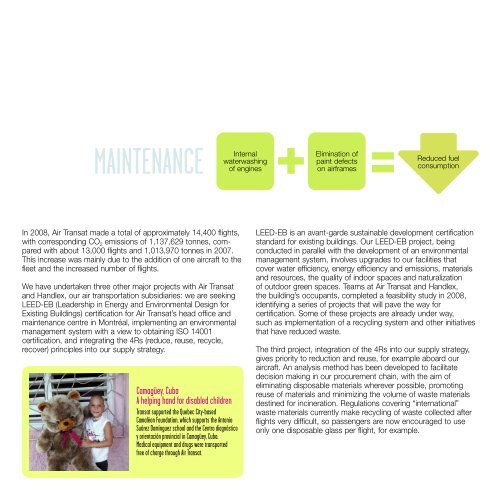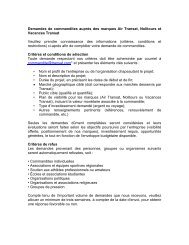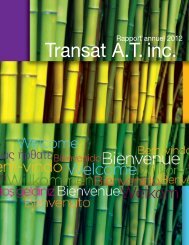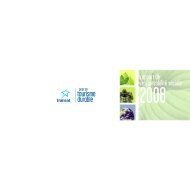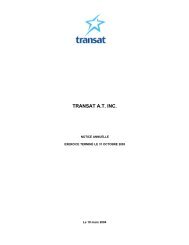Transat Corporate Responsibility Report, 2008 - For Sustainable ...
Transat Corporate Responsibility Report, 2008 - For Sustainable ...
Transat Corporate Responsibility Report, 2008 - For Sustainable ...
Create successful ePaper yourself
Turn your PDF publications into a flip-book with our unique Google optimized e-Paper software.
MAINTENANCE<br />
Internal<br />
waterwashing<br />
of engines<br />
+ =<br />
Elimination of<br />
paint defects<br />
on airframes<br />
Reduced fuel<br />
consumption<br />
In <strong>2008</strong>, Air <strong>Transat</strong> made a total of approximately 14,400 flights,<br />
with corresponding CO 2 emissions of 1,137,629 tonnes, compared<br />
with about 13,000 flights and 1,013,970 tonnes in 2007.<br />
This increase was mainly due to the addition of one aircraft to the<br />
fleet and the increased number of flights.<br />
We have undertaken three other major projects with Air <strong>Transat</strong><br />
and Handlex, our air transportation subsidiaries: we are seeking<br />
LEED-EB (Leadership in Energy and Environmental Design for<br />
Existing Buildings) certification for Air <strong>Transat</strong>’s head office and<br />
maintenance centre in Montréal, implementing an environmental<br />
management system with a view to obtaining ISO 14001<br />
certification, and integrating the 4Rs (reduce, reuse, recycle,<br />
recover) principles into our supply strategy.<br />
Camagüey, Cuba<br />
A helping hand for disabled children<br />
<strong>Transat</strong> supported the Quebec City-based<br />
Camaléon Foundation, which supports the Antonio<br />
Suárez Domínguez school and the Centro diagnóstico<br />
y orientación provincial in Camagüey, Cuba.<br />
Medical equipment and drugs were transported<br />
free of charge through Air <strong>Transat</strong>.<br />
LEED-EB is an avant-garde sustainable development certification<br />
standard for existing buildings. Our LEED-EB project, being<br />
conducted in parallel with the development of an environmental<br />
management system, involves upgrades to our facilities that<br />
cover water efficiency, energy efficiency and emissions, materials<br />
and resources, the quality of indoor spaces and naturalization<br />
of outdoor green spaces. Teams at Air <strong>Transat</strong> and Handlex,<br />
the building’s occupants, completed a feasibility study in <strong>2008</strong>,<br />
identifying a series of projects that will pave the way for<br />
certification. Some of these projects are already under way,<br />
such as implementation of a recycling system and other initiatives<br />
that have reduced waste.<br />
The third project, integration of the 4Rs into our supply strategy,<br />
gives priority to reduction and reuse, for example aboard our<br />
aircraft. An analysis method has been developed to facilitate<br />
decision making in our procurement chain, with the aim of<br />
eliminating disposable materials wherever possible, promoting<br />
reuse of materials and minimizing the volume of waste materials<br />
destined for incineration. Regulations covering “international”<br />
waste materials currently make recycling of waste collected after<br />
flights very difficult, so passengers are now encouraged to use<br />
only one disposable glass per flight, for example.


